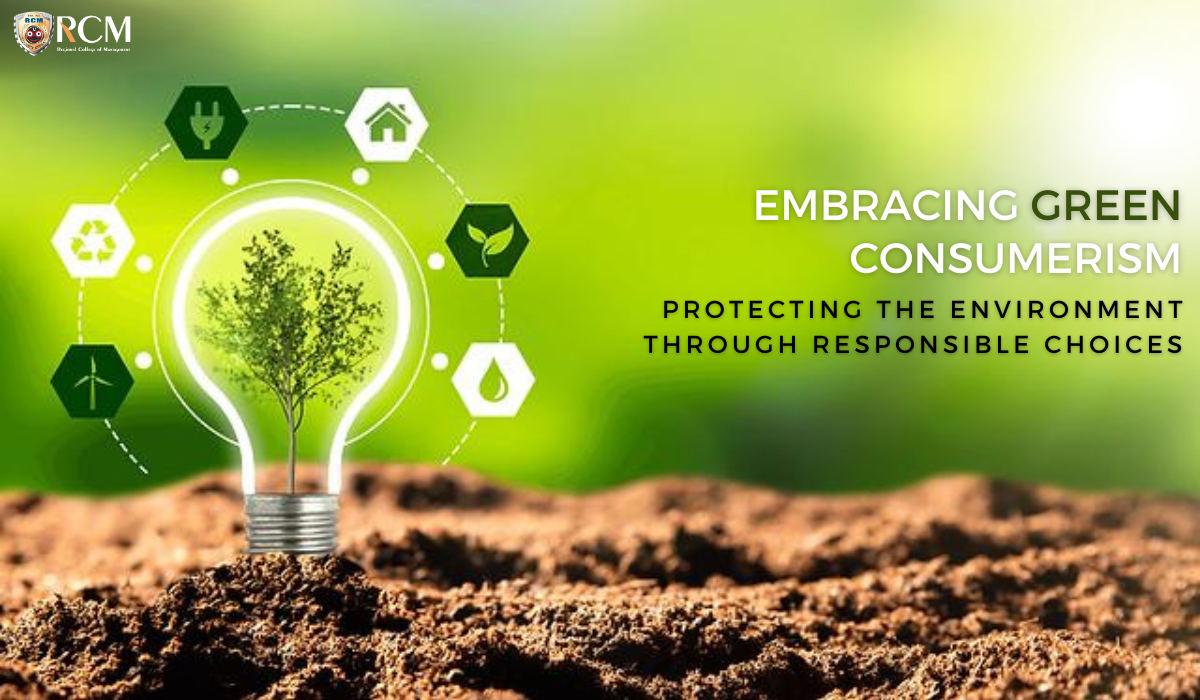Written by Dr. Manas Ranjan Debata || Dean Academics
Green consumerism is an essential aspect of sustainable living, as it involves selectively purchasing products that are environmentally friendly and contribute to the conservation of resources. By opting for green products, which often contain recycled materials, conserve energy and water, and minimize waste and pollution, consumers play a vital role in protecting the environment.
This blog explores the significance of green consumerism, highlighting the role of green consumers and the benefits of eco-friendly products in promoting a greener and more sustainable lifestyle while analysing the effects of consumerism on the environment.
The Role of Green Consumers
Energy Conservation:
Green consumers actively strive to save energy consumption by adopting energy-efficient practices in their daily lives. This includes using energy-saving appliances, turning off lights when not in use, and maximizing natural lighting and ventilation. Reducing dependence on fossil fuels through energy conservation helps decrease carbon emissions and mitigate environmental pollution.
Renewable Energy Sources:
Green consumers support the use of solar products and renewable energy resources by investing in solar panels, utilizing solar-powered devices, and advocating for the adoption of clean and sustainable energy alternatives. Shifting towards renewable energy significantly reduces the effects of consumerism on the environment, helping to lower reliance on fossil fuels and decreasing the amounts of waste produced from non-renewable energy sources.
Checking Energy Levels in Products:
Green consumers make informed choices by considering the energy levels of daily utility products. They opt for energy-efficient options that consume less power, helping to reduce overall energy consumption and utility bills. Conscious consumer spending on sustainable goods and services minimizes the effects of consumerism on the environment.
Recycling and Eco-friendly Products:
Green consumers prioritize the use of recycled and eco-friendly products. They actively participate in recycling programs, reduce waste through proper waste management practices, and opt for products that are made from sustainable materials and have minimal packaging. This reduces the amounts of waste generated by industries like fast fashion, which significantly contributes to environmental pollution.
Supporting Local and Organic Food:
Green consumers promote sustainable agriculture and food systems by buying locally grown and organic food. This reduces the carbon emissions associated with long-distance transportation and supports local farmers who adopt eco-friendly farming practices. The supply chain of food production plays a crucial role in determining the effects of consumerism on the environment.
Practicing Sustainable Consumption:
Sustainable consumption is a key principle that green consumers follow. By making conscious choices and adopting green behaviors, they aim to minimize energy use, reduce waste, and mitigate their impact on the environment. Sustainable consumption involves using resources wisely, minimizing the production of waste, and opting for environmentally friendly alternatives whenever possible. The rising trend of online shopping has increased consumer spending, but mindful purchasing can help counteract the effects of consumerism on the environment.
Green Consumerism and Its Benefits
Energy Efficiency and Cost Savings:
Green consumerism results in reduced energy consumption, lower utility bills, and long-term cost savings. By choosing energy-efficient appliances and products, consumers can contribute to energy conservation and reduce their environmental impact. The supply chain of goods and services can also be optimized for sustainability, lowering carbon emissions.
Emission Reduction:
By embracing green consumerism, individuals can help lower greenhouse gas emissions and combat climate change. Energy-efficient practices and the use of renewable energy sources contribute to a cleaner and more sustainable future. The effects of consumerism on the environment are evident in industries like fast fashion, which produce large amounts of waste and use significant amounts of fossil fuels
Economic Growth and Energy Demand:
Green consumerism drives the demand for sustainable and clean energy solutions, fostering innovation and economic growth in the renewable energy sector. This transition to cleaner energy sources is crucial for meeting the growing energy demand while minimizing environmental pollution. In the United States, policies promoting green consumerism help reduce the effects of consumerism on the environment, ensuring a more sustainable future..
Conclusion
Embracing green consumerism is not only an effective way to protect the environment but also a crucial step toward sustainable living. Moreover, green consumers play a significant role in saving energy, supporting renewable resources, practicing sustainable consumption, and reducing waste.
For instance, by choosing eco-friendly products and adopting energy-efficient practices, individuals can contribute to a greener future. As a result, they reduce their environmental footprint and inspire others to follow suit. In addition, the effects of consumerism on the environment can be mitigated through responsible consumer behavior, conscious consumer spending, and support for sustainable goods and services.
Ultimately, green consumerism is a powerful force for positive change. Therefore, observing Green Consumers Day on the 28th of September each year serves as a reminder of the importance of responsible consumption and its impact on the environment.





















